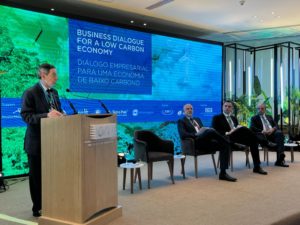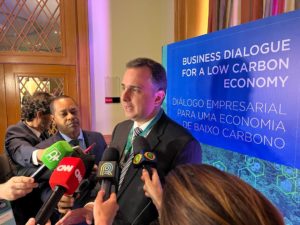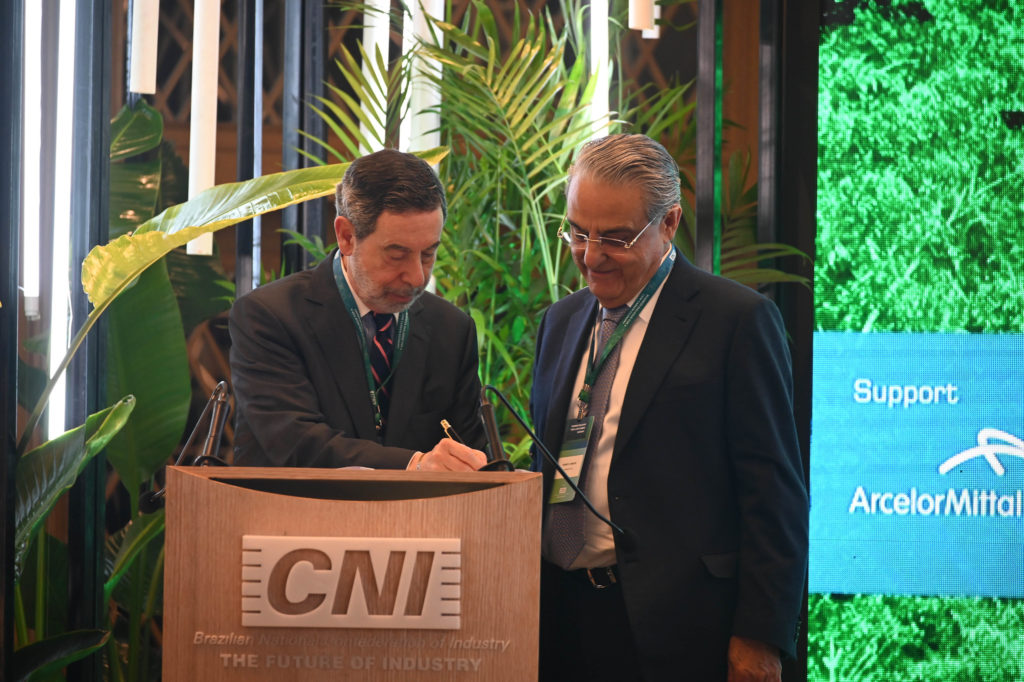Sharm El Sheikh – The Arab Brazilian Chamber of Commerce (ABCC) and the Brazilian National Confederation of Industry (CNI) signed a term of commitment this Tuesday morning (15), in Sharm El Sheikh, Egypt, in an event parallel to the United Nations Framework Convention on Climate Change (UNFCCC COP27), at the Renaissance hotel.
The term aims to draft an institutional plan for COP28, to take place in Dubai, United Arab Emirates, in 2023, and develop cooperation. The document also establishes a joint practical framework for creating a strategic plan between Brazil and the Arab countries aimed at a low-carbon economy for the industry.
The term was signed by the president of the CNI, Robson Braga de Andrade (pictured above, right), and the president of the ABCC, ambassador Osmar Chohfi (left). In addition to Andrade and Chohfi, the president of the Brazilian Senate, Rodrigo Pacheco, and the Brazilian Federal Audit Court (TCU) judge Benjamin Zymler participated in the event’s opening.

At the opening of the Business Dialogue for a Low Carbon Economy event, Robson Braga de Andrade defended implementing a national strategy based on four pillars: Energy transition, carbon market, circular economy, and forest conservation. The CNI prepared, within these pillars, a set of guidelines to be developed in partnership between the government and the industry, aiming to accelerate the consolidation of the low-carbon economy in the country. “The industry expects the suggestions will be considered in the projects of the elected government, helping the country overcome adversities and progress in the next four years,” he declared.
Braga de Andrade said the world urgently needs to face two critical challenges: Transforming production models and consumption habits to reduce greenhouse gas emissions and contain global warming, and implementing measures aimed at adaptation and increasing the resilience of countries to the devastating impacts of storms, floods, droughts, and other extreme events caused by climate change.
“Giving adequate and practical answers to these questions is vital at this time and requires compelling and urgent actions to guarantee food security and avoid the risk of shortages. Brazil has the necessary conditions to be one of the leaders of the global effort seeking to overcome these adversities and the transition to a low-carbon economy,” declared the president of the CNI, who stated the confederation has encouraged business initiatives and acted with the national government towards the implementation of a consistent plan for the decarbonization of the economy.
Brazilian government
The TCU judge stated the decarbonization of the industry requires attention from both the public and private sectors and highlighted the energy transition as a way to reduce emissions, replace polluting sources with renewables, and efficiently manage power demand. He said investments in science and technology, infrastructure, energy efficiency, and digitalization are needed to reduce emissions, as well as in the social sphere, to reduce inequalities and have social justice for the most vulnerable partitions of the population, the most impacted by climate change. “The foremost objective, in addition to decarbonization, is to have a more inclusive and fairer society,” said Benjamin Zymler.

The president of the Brazilian Senate, Rodrigo Pacheco, said there is a need for a sustainable action plan to properly fight illegal deforestation and restore Brazil’s reputation. “Today, there is an image crisis [in Brazil] based on deforestation,” said the senator, who also stated illegal mining in indigenous lands will be fought. “No country will invest in Brazil if there is no concern for the environment,” he added, saying the Mercosur-European Union free trade agreement was not yet signed due to deforestation issues. He concluded by saying the Senate’s absolute commitment to economic development and job creation is in line with preserving the environment.
“We just want the law to be complied with and for people to be aware it is better to preserve than to devastate,” Pacheco told the press at the event’s closing. “We are looking for an image recovery for Brazil, so expectations with the participation of the president-elect at COP27 are positive, on international relations to be sound and purposeful, resumption of Brazil’s protagonist; we have a much work for the president-elect to establish planning and effective actions with a minimum or zero tolerance for illegal deforestation,” said Pacheco, proposing an alignment between the legislative and executive powers.
For him, recovering international relations is a priority. “International organizations and companies would like to invest in Brazil as soon as the country manages to reconcile fiscal balance with environmental awareness; then we will have great development in the country,” said Pacheco.
Brazil & Arabs
Osmar Chohfi stated there is an excellent prospect of cooperation in the context of bilateral relations between Brazil and Arab countries. “On the Arab side, for instance, many countries have already defined bold commitments to decarbonization, and their governments have committed to making long-term investments to structure green and modern production chains totally based on innovation,” said the ABCC president.
Several Arab countries have frameworks for 2030 with ongoing actions to increase the share of renewable energy in the power matrix, mainly through solar, wind, and biomass energy generation. “These plans also include investments in scientific research for the innovation needed for the transition of Arab economies to the post-oil era, with the structuring of sustainable and fully circular production chains,” said Chohfi.
Brazil is capable of contributing to the Arab effort to expand the local supply of food, said Ambassador Chohfi, underscoring the investments Brazilian agribusiness companies already make in Arab countries, also making available in these regions the expertise of national agribusiness in sustainable production and biotechnology.
“There is great interest from the Arab countries in incorporating renewable energy options to their power matrixes, an opportunity in which, for example, ethanol could be included,” he said.
For the president of the ABCC, the Arab countries would find in Brazil “a more favorable environment for carrying out joint projects aimed at decarbonizing their economies, with environmental preservation, sustainable development and the development of innovations treated duly prioritized by the Brazilian State.”
Translated by Elúsio Brasileiro




